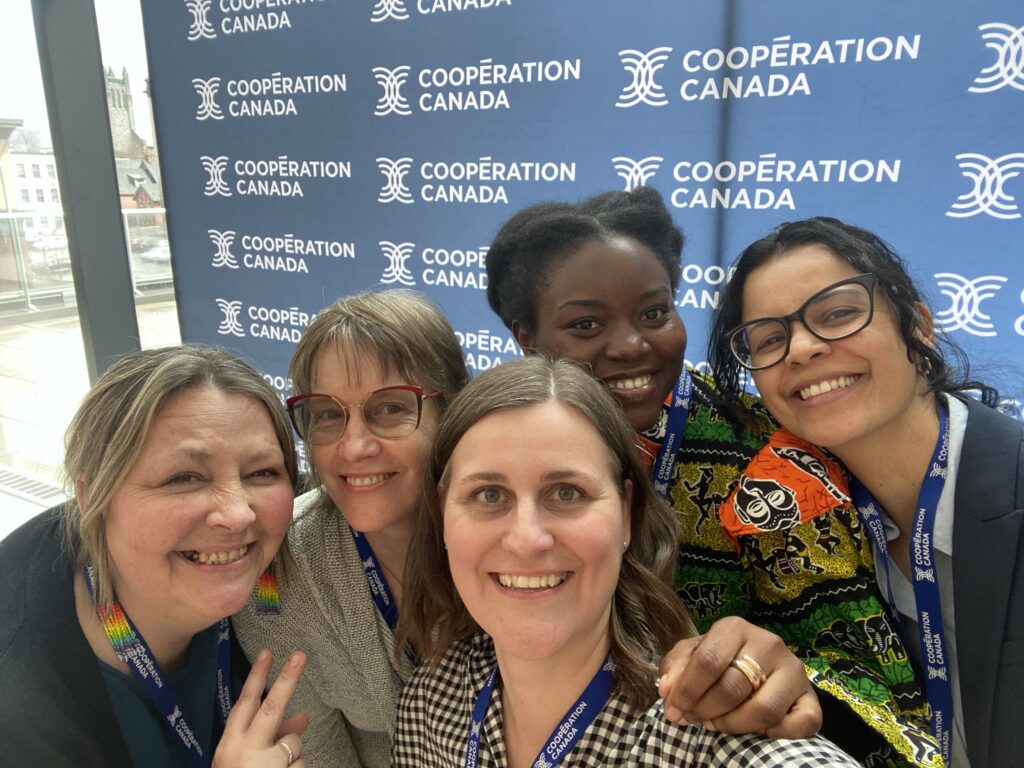Civil society presses G7 on debt and climate at 2025 C7 Summit
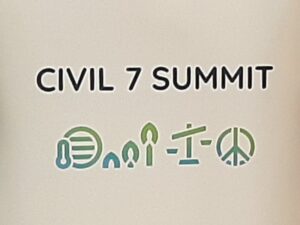
Civil society’s calls for debt cancellation and climate justice took a step forward April 14-15, thanks in part to the leadership of Global South and Jubilee Canadian advocates at the 2025 Civil 7 (C7) Summit in Ottawa.
Beth Lorimer, KAIROS’ Ecological Justice Coordinator, and Dean Dettloff, Advocacy Officer for Development and Peace – Caritas Canada, were among over a hundred civil society representatives who gathered in Ottawa with the aim to ensure that pressing social and ecological justice issues are reflected in Global 7 (G7) deliberations and decisions when the leaders meet in Alberta in June.
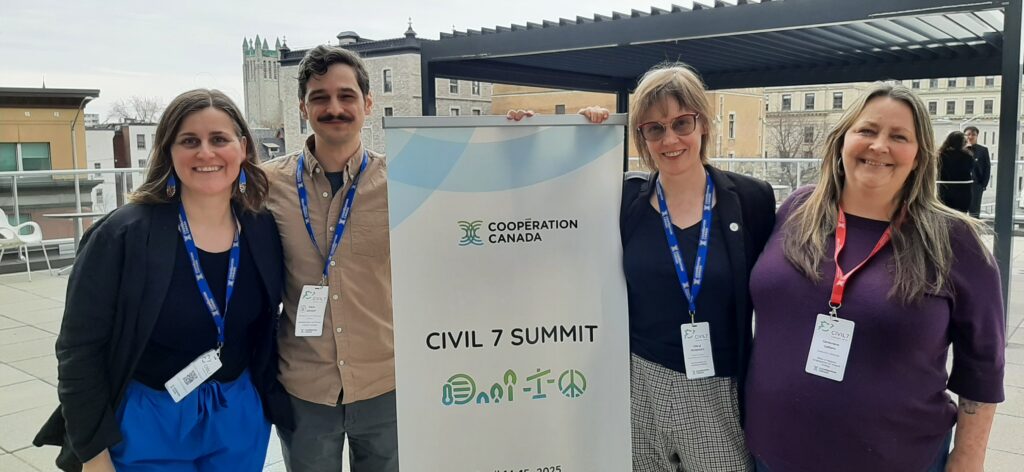
Lorimer and Detloff played key roles within the summit’s working groups, helping to secure strong, justice-driven language on fossil fuel phaseout, climate finance, and debt reform in the final C7 Communiqué handed to Canada’s G7 Sherpa, Cindy Termorshuizen.
Lorimer, serving on the Climate, Energy, and Environment Working Group, described the experience as both a privilege and responsibility.
“It didn’t strike me how significant the process was until I was in the room and hearing people speak about shrinking civic space—not just in the Global South, but here too,” she said. Lorimer was particularly proud that the C7’s climate section led with a clear call for a just transition away from fossil fuels—an achievement she called “very significant,” even if political follow-through remains uncertain.
On the economic front, Dettloff worked with international colleagues in the Economic Justice Working Group to elevate demands for debt cancellation and systemic financial reform.
“It might not seem like a big deal,” he said, “but it’s a big ask.” Achieving consensus around ambitious debt justice language, he added, showed how deeply organized and globally connected civil society has become. “We know each other. We’ve read each other’s reports. So when we meet, we already know the terms of discussion.”
Both Lorimer and Dettloff are part of the Jubilee: Turn Debt into Hope’s core advocacy team in Canada calling for the cancellation of unjust and unsustainable debts, as well as financial reform. Their work helped ensure that debt justice is a foundational pillar of civil society’s demands to the G7.
Civil society steps up
The C7 Summit brought together civil society representatives from across the globe, in person and online, to confront the gravity of intersecting crises: climate change, economic inequality, debt distress, democratic erosion, human rights violations and gender-based violence. Participants were united not only by critique but by bold, coordinated demands for transformative action.
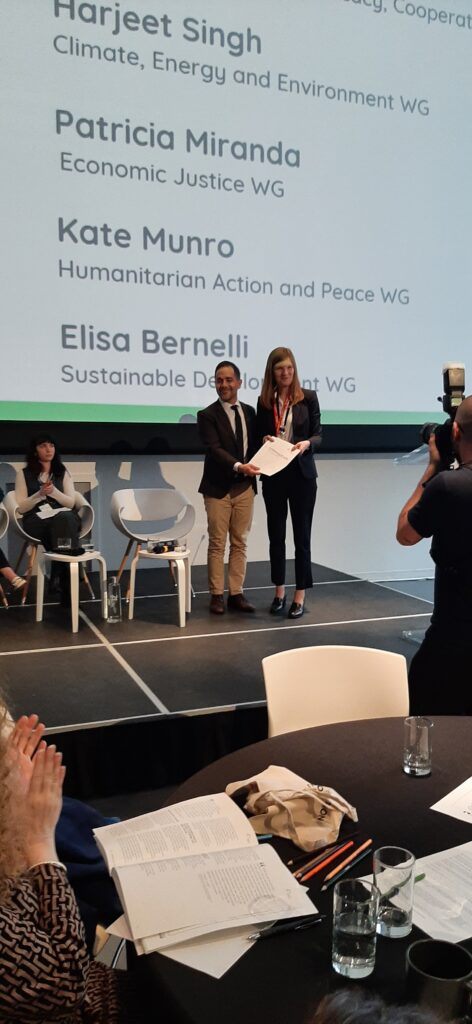
The summit culminated in the formal presentation of the C7 Communiqué to Canada’s G7 Sherpa, Cindy Termorshuizen, with diplomatic representatives from G7 countries in attendance. The communiqué, organized around four pillars—Climate, Energy and Environment, Economic Justice, Humanitarian Action and Peace, and Sustainable Development—calls for systemic reforms rooted in human rights and global equity.
“What the Civil 7 asks of the G7 is not simple, but it is straightforward: reinvest in global cooperation by centering people and planet in every decision.” – Civil 7 Communiqué.
In response, Sherpa Termorshuizen acknowledged the gravity of the issues raised and the vital role civil society plays in shaping effective G7 leadership. While noting the limitations on her remarks due to Canada’s election period, she pledged that the recommendations would be shared widely and taken seriously across all working levels of the G7 process.
Crisis, resistance and resilience
The summit unfolded against a backdrop of intensifying repression and global instability. In a searing opening panel, activists from Afghanistan, Ukraine, Nigeria, and Canada detailed how civic spaces are shrinking under the pressure of authoritarianism, war, and surveillance.
“Security for us, it’s not just borders and weapons,” said Nina Potarska, Director of the Center for Social and Labour Research in Ukraine. “It’s about economic stability. It’s trust. It’s mental health. The ability to speak freely.”
Calls for global financial reform were equally urgent. At the Financing for Development panel, Harjeet Singh, Founding Director of Satat Sampada Climate Foundation said, “Whether we talk about the debt crisis, whether we talk about the rising inequality, climate crisis or biodiversity crisis, their cause remains the same. It’s the financial architecture…. Unless we target those structural causes head on, we will not be able to deal with it.”
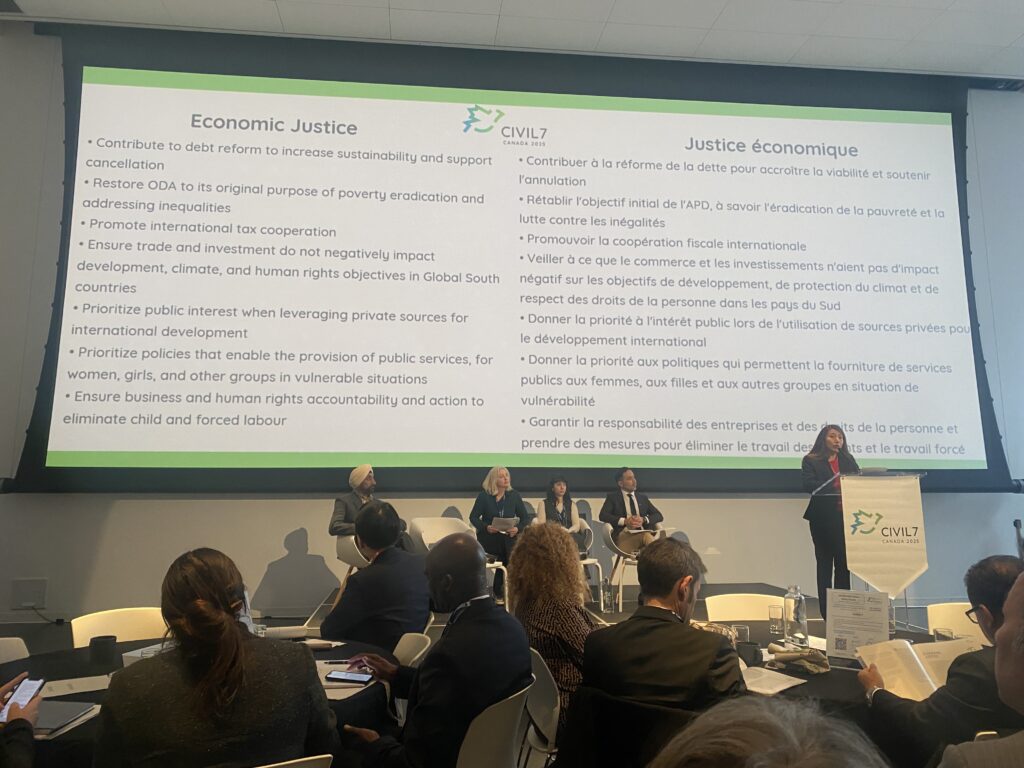
Fellow panelist Patricia Miranda, Global Advocacy Director of LatinDadd, emphasized that servicing debt is not a neutral act: it actively undermines basic rights like education and healthcare. Miranda coordinated the Economic Justice Working Group.
Throughout the summit, participants stressed the need to reframe aid as reparation—not charity—and to link climate finance with debt justice.
The Summit’s final panel on international cooperation in a changing world order explored the fractures and future of multilateralism, and how civil society and governments alike can help shape a just global order in a time of deep geopolitical disruption.
During this panel, his Excellency Rieaz Shaik, South Africa’s High Commissioner to Canada noted that while many in the Global North are only now shocked by the unraveling of the Western liberal order, countries like his have long experienced its failures. He challenged the idea of a “rules-based international order,” suggesting that what’s needed are not rules made by the West, but true international law, applied equally. For Shaik, a just future hinges on reviving real multilateralism, rooted in equity, shared sovereignty, and accountability.
Kate Gillis, Sr. Policy Advisor, International Relations at the Métis National Council delivered a compelling Indigenous analysis of international cooperation. She highlighted how global institutions—from the G7 to the UN—were not built for Indigenous peoples, youth, women, or LGBTQ+ communities. “We’re still fighting for a seat at the table,” she said. Gillis emphasized the importance of Indigenous-led coalitions, public education on global governance, and the need for Canada to step up as a meaningful leader—especially given its G7 and ECOSOC (United Nations’ Economic and Social Council) presidencies.
Global solidarity in action
The Civil 7 (C7) is one of several official G7 engagement groups, alongside the Women 7 (W7), Labour 7 (L7), Youth 7 (Y7), Business 7 (B7), Science 7 (S7) and Think 7 (T7). Pride 7 (P7) is an unofficial engagement group.
Cooperation Canada, of which KAIROS is a member, has led the coordination of the C7 process this year, and has tried to ensure that marginalized voices—especially from the Global South—were reflected in C7 process and communiqué.
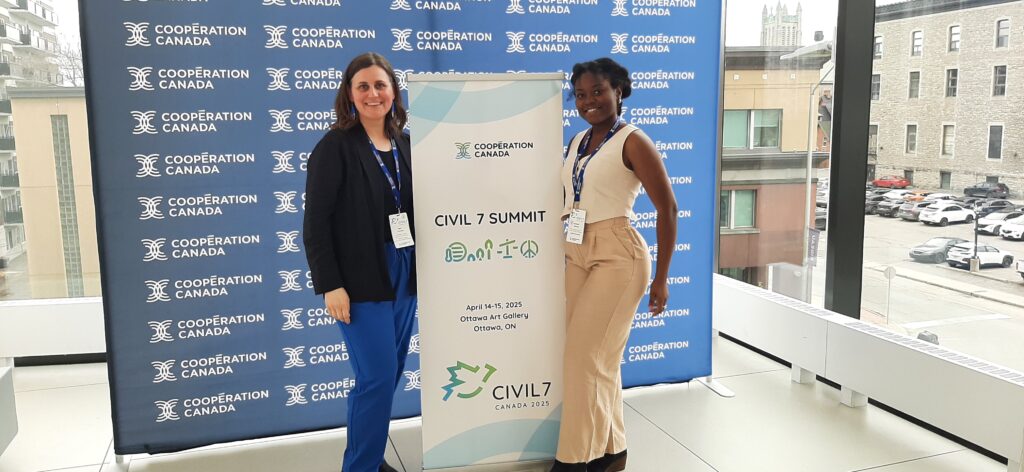
Danielle Kamtié, KAIROS’ Africa Partnerships and Global Climate Justice Program Coordinator, contributed to the W7 Climate Working Group, further connecting feminist and climate justice movements. KAIROS has signed on to the W7 communique, which was released on April 29, to Sherpa Termorshuizen and members of Global Affairs Canada.
The W7 communique, based on previous work of the W7 and input from activists from around the world, calls on G7 governments to confront the deepening global inequality crisis through bold, gender-just economic policies and urgent action on climate, care, and digital equity.
What emerged from the C7 and W7 was not only a powerful set of demands but a demonstration of civil society’s growing unity, strategy, and intersectional analysis.
“Movements save lives,” said Beth Woroniuk, Senior of the Feminist Foreign Policy Collaborative, citing a feminist from Mexico. “And movements need intersectionality, solidarity and openness to learn and to build and grow together.”
Strategic moment
As Canada leads the G7 through 2025, the stakes could not be higher. While Sherpa Termorshuizen pledged to carry civil society’s recommendations forward, many activists acknowledged that real change will depend on sustained pressure and public engagement.
Still, for representatives like Lorimer and Dettloff, the C7 was a crucial moment to claim space, set narratives, and chart a path toward deeper transformation.
“We had this space,” said Lorimer. “We needed to take up this space—and use it as strategically as possible.”
Civil society has made its case. Now, it is up to the G7 to decide whether to rise to the challenge.
